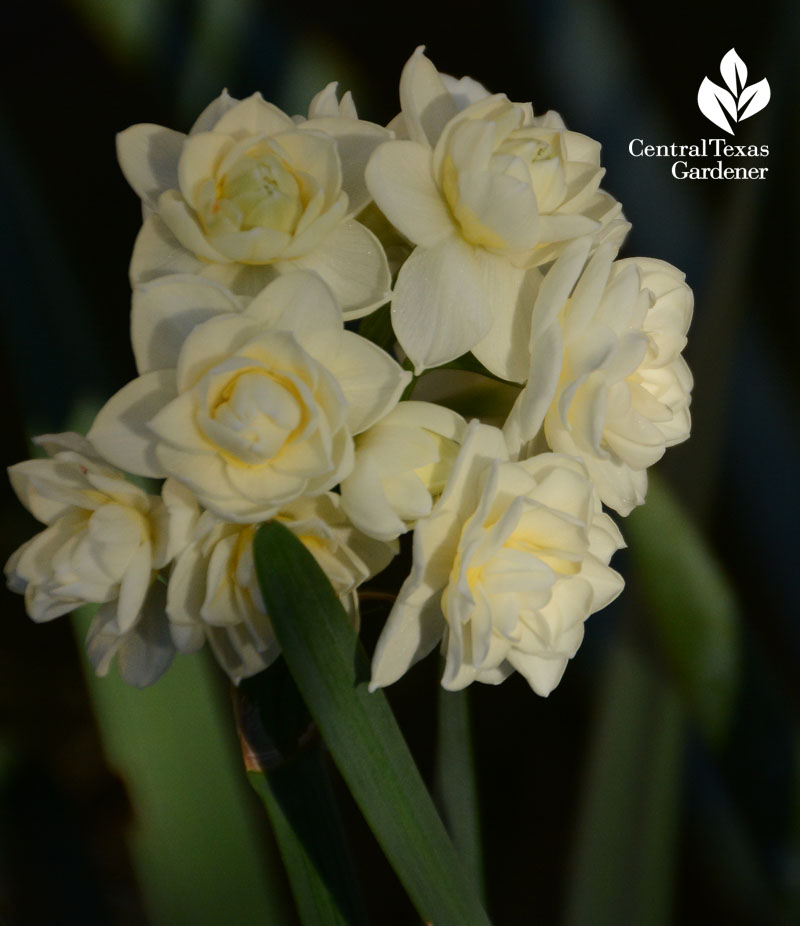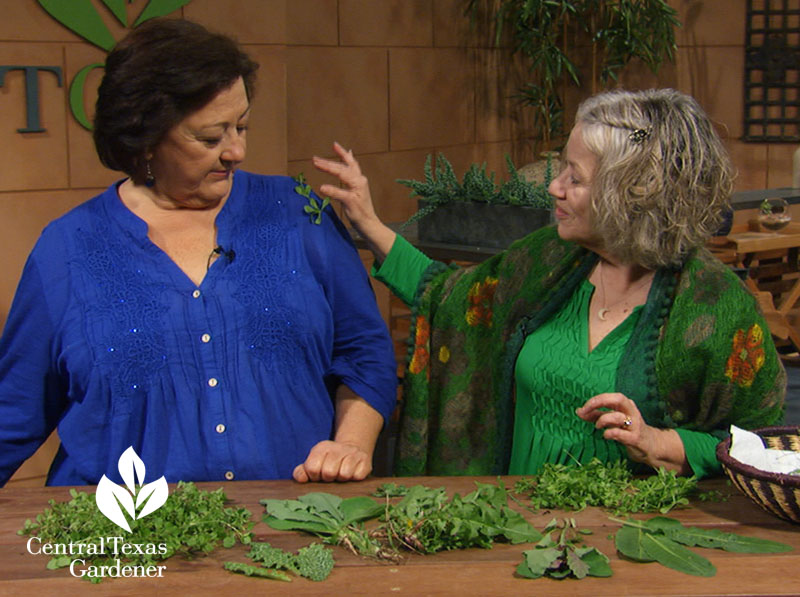February 23, 2017
Moonlit Flowers + Dwarf Goats & Chickens!
Often, it’s after hours when we head to the garden to wind down. On humid nights right now, Narcissus ‘Erlicheer’ sends a fragrant whiff my way.

To catch us by surprise, various perennial rain lilies pop up spring through fall when times are right.

Drought tough evergreen shrub Spiraea is a heritage garden classic, here blooming against Lady Banks rose a year or so ago. Actually, it’s blooming right now, but Lady Banks hasn’t completely flushed out yet.

White Lady Banks rose is the fragrant one. These are drought tough “go big” screening roses that require little attention beyond pruning to keep in bounds!

Native Texas blue grass (Poa arachnifera) promenades flowery seed heads in mid-spring, here against blackfoot daisy (Melampodium leucanthum).

Silvery Yucca pallida spikes up the light, again with blackfoot daisy.

Native silver ponyfoot (Dichondra argentea) covers the ground nicely against silvery Agave parryi var. truncata. Beyond, firecracker fern (Russelia equisetiformis) brings by hummingbirds and butterflies to enjoy the daylight contrast.

In summer, native Datura attracts bees by day and pollinating moths by night.

My summer-blooming crinum lilies are tough as nails about drought, freeze, and rain bombs.

And in fall, we’ve got the grasses, like this special one, Muhlenbergia sericea ‘White Cloud’. If you can’t find it, native Lindheimer muhly covers the drama just fine.

In Plano, Michael McDowell banished his lawn for a gorgeous, water thrifty design. In one of his many personable, inspiring blogs at Plano Praire Garden, see how he lights up the night with plants. In this picture, native Aloysia gratissima, a small shrubby tree, frames understory plants. His selection guarantees that he’ll always spot wildlife in action on his front yard strolls.

Evergreen Confederate (or star) jasmine is popular as a screening vine on trellises or fences. In spring, it’s the star performer to pump out sweet perfume for weeks.

Keep that sweet jasmine scent going with sambac jasmine that perfumes containers or garden beds from late spring to fall.

I grow mine in a winter-protected patio container, since hard freezes mean its doom. Plus, it greets my morning and ends my day with a fragrant whoosh.

At the Travis County AgriLife Extension demonstration garden, it’s actually been evergreen in the ground several winters in its bright shade location. Only time will tell if it makes it back after our below 30° freeze bomb. Get Daphne’s growing tips as CTG’s Plant of the Week.

Amanda Moon from It’s About Thyme joins Tom on a fragrant voyage with plants that glow by moonlight.

In cool weather, romantic cyclamen, silvery dusty miller and fragrant alyssum (to attract pollinators) sweetens the deal, even in containers.

A trouble free container plant I’d never considered—but will do so right now—is variegated airplane plant. These are the easWiest ones to grow in a hanging basket to light up that balcony or patio.

In April, seed moonflowers against a trellis or obelisk. Like Karen Curry from Georgetown, you’ll want it close up to catch its fragrance and perhaps a shot of a pollinating moth.

Amanda shows off an orchid I’ve never met, but now I must have one! Brassovola nodosa, appropriately named Lady of the Night, is one for the “regular” folks who want to grow easy-care orchids, she tells us.

Blooming in January and February, she likes it for its citrusy scent, most pronounced at night. She never fertilizes this “tough as nails” beauty. She keeps them on the dry side, watering more in summer and less in winter. “Plant in orchid bark in a container matching their size. A little light shade in the warmer months keeps them from spotting or burning from too much sun. In the winter, keep from freezing,” Amanda notes. Watch now.
Thanks to the rain and our early spring, things we didn’t plant (aka “weeds”) are having a field day. Herbalist Ellen Zimmerman joins Trisha to identify a few of your “foes” and how this field of greens is good for you! Watch now.

On tour at Whitney Nolen’s, we’ve got your goat!

And meet the rooster that attacked me!

Okay, it was my fault, since I wanted a peek inside his cute house. Guess I looked like a raccoon. Bad hair day. We made up.

We had a blast at Whitney’s small urban backyard farm, a dream of hers since childhood.

Now, with partner Jesse Adkins, she raises Nigerian Dwarf goats and chickens in a standard backyard to provide eggs and milk to the neighborhood.

A teacher at St. Francis School, Whitney loves to teach the sustainable lessons she learned as a child, even hosting a summertime camp for her students.

Goats Nutmeg and Vindaloo provide about a gallon of milk a day several months a year.

After straining (and pasteurizing if neighbors want that), Whitney fills growler containers from beer-making friends and hops on her scooter to make the rounds to the neighborhood.

Whitney and the neighbors also turn fresh milk into yogurt, cheese, and soap (which really softens gardener skin!).

Running bamboo’s a yummy snack, so the goats are in much demand by neighbors who want natural control.


Since goats and chickens will eat LOTS of things, Whitney corrals her vegetable garden. Oh, the playscape’s for the baby goats who love to climb up and slide down.

There’s lots for the goats to eat and play with inside their comfy quarters connected to the chicken coop.

Austin rules for livestock in your backyard? Whitney tells us, “Coops for chickens have to be 50 feet from every neighbor’s dwelling. If you have miniature goats, you can have one to six and their pen just needs to be 50 feet from every neighbor’s dwelling just like the chicken coop. “

Whitney started Austin Backyard Goat Meetup where you can get one-on-one tips for raising your own sweet goats. Connect with her on Facebook.
And, Vindaloo hopes you’ll stop by on the Funky Chicken Coop tour April 15 to get her autograph.

Watch the whole story now!
Thanks for stopping by! Linda
tags:

